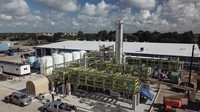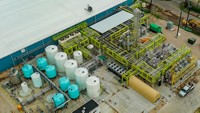Advertisement
Grab your lab coat. Let's get started
Welcome!
Welcome!
Create an account below to get 6 C&EN articles per month, receive newsletters and more - all free.
It seems this is your first time logging in online. Please enter the following information to continue.
As an ACS member you automatically get access to this site. All we need is few more details to create your reading experience.
Not you? Sign in with a different account.
Not you? Sign in with a different account.
ERROR 1
ERROR 1
ERROR 2
ERROR 2
ERROR 2
ERROR 2
ERROR 2
Password and Confirm password must match.
If you have an ACS member number, please enter it here so we can link this account to your membership. (optional)
ERROR 2
ACS values your privacy. By submitting your information, you are gaining access to C&EN and subscribing to our weekly newsletter. We use the information you provide to make your reading experience better, and we will never sell your data to third party members.
Green Chemistry
Solugen raises cash to build green chemical factories
The firm uses enzymes and catalysts to make chemicals without fossil fuels
by Matt Blois
November 2, 2022
| A version of this story appeared in
Volume 100, Issue 39

After raising more than $350 million last year, the sustainable chemicals company Solugen has raised another $200 million to start building its next factories and expand into new markets.
Solugen, one of C&EN’s 10 start-ups to watch in 2018, hopes to use a combination of enzymatic and catalysis manufacturing processes to make cheap, high-performance chemicals without fossil fuels.
Solugen’s first factory has been operating in Houston, Texas, for about a year. It produces more than 10,000 metric tons per year of several different molecules from a corn sugar feedstock. The company’s first products were hydrogen peroxide and gluconic acid, which are used in water treatment to prevent calcium phosphate scaling and metal corrosion. More recently, Solugen started selling glucaric acid–made by oxidizing gluconic acid with hydrogen peroxide. Glucaric acid reduces scaling and increases the cleaning power of automatic dishwasher detergents.
CEO Gaurab Chakrabarti says the latest round of funding will help Solugen produce a new, unnamed molecule, which will also fight scaling and corrosion in a large industry. Chakrabarti says this product will likely be the company’s biggest. “We’re moving up in the world of volumes,” he says.
Josh Haslun, an analyst with Lux Research, says synthetic biology companies like Solugen would be wise to build a strong position in one market before branching out. “This isn’t a case to diversify rapidly,” he says. “It’s a case of finding the right business.” If companies can generate sustainable revenue in a large industry, Haslun says that can feed back into R&D and allow them to diversify into other chemicals later on.
Solugen claims its processes could also produce chemicals for building materials, cleaning products, and oil wells. But Chakrabarti says Solugen is staying focused on a handful of products for the next few years. “We should focus on those markets and molecules where we know we have a really distinct advantage,” he says.




Join the conversation
Contact the reporter
Submit a Letter to the Editor for publication
Engage with us on Twitter